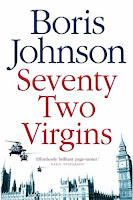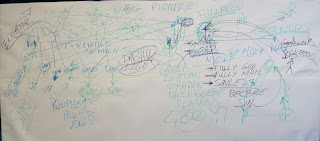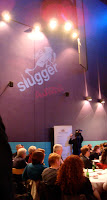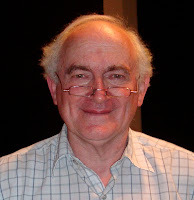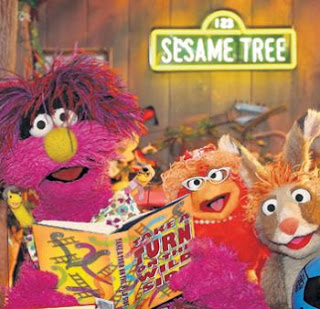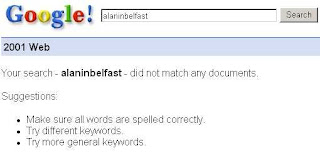
On a previous visit to Northern Ireland in his role of chairman of the committee tasked with nominating the UK’s European Capital of Culture, Gerry Adams (jokingly) told Sir Jeremy Isaacs not to come back if he didn’t pick Belfast.
But the media industry and current affairs veteran was back in town on Sunday night as part of a Belfast Festival talk in the Linenhall Library, sponsored by local current affairs and factual indie Below the Radar.
The Festival were operating a no photographs rule - in case someone stole the speaker’s image? Anything in quotation marks is as accurate a quote as I was able to scribble down. This post is designed to capture what Isaacs said, and make it available to the wider local debate about PSB, rather than be any reflection of my personal opinion.
Well known for producing long-running documentary series like The World at War (26 part, broadcast while I was still in nappies), Ireland: A Television History (1980/1) and Cold War (24-part, 1998/9), he was the first chief executive of Channel 4 when it launched twenty six years ago before moving onto a turbulent spell at Covent Garden’s Royal Opera House.
The talk began with his definition of how diversity can be identified in broadcasting, namely characteristics like “ethnic origin, location and accent”, where Isaacs reckoned that accent (the age, gender, mood etc) was a key quality:
“Listen out for the individual voice of a programme maker with something to say. They’re rare as hens teeth.”
Isaacs’ reckoned that today’s plethora of digital channels doesn’t “signify diversity” but instead points to “separation - films there, pop here”. Diversity should draw different genre and content together on a channel.
The old system of ITV regions created a set of powerful production centres that supplied network programming as well as their own regional content. So Coronation Street was a product of Granada, the north west of England franchise holder. Each ITV region chose whether or not to show the soap ... though they all did within four months of the show starting!
In contrast, Isaacs felt that today, the once diverse ITV has collapsed the majority of the regions down to single ownership and central control and is making drastic reductions in its regional news teams and non-news output.
“Diversity vanishing fast.”
The BBC’s Pebble Mill Studios opened in 1971, and its Birmingham network drama department commissioned programmed using their devolved responsibility. They decided what was made and ultimately put into the schedule.
Jana Bennett made an announcement last week about increasing the BBC’s out-of-London network programme spend to 50% by 2016, setting up regional production targets and movement of well-known network programmes to be sited in geographic production centres across the UK. (So by 2016, Northern Ireland’s contribution to BBC network programmes should rise from 0.4% to 3% ... better reflecting the proportion of licence fee payers living here.) Four or more network commissioning posts are also being created across Scotland, Wales and Northern Ireland.
While not insisting on geographic quotas, Isaacs argued that there is “still a requirement for devolution to prevent material having to make its way to the centre and then make its way back out again”.
“Radio and TV properly conducted ... give us an idea of the nation talking to itself ... many distinctive voices need to be heard though they may provoke complaints that they can’t be understood!”
Isaacs’ explained that while “we now know there’s no such thing as a mass audience” and “broadcasters need audiences large enough to make programmes viable”, the pursuit of the maximum audience is ultimately “boring”. He felt that the trend should be fought.
He suggested some audience reactions to good Public Service Broadcasting
- “Be Surprised
- Encounter the new
- Get a life”
while improving the current state of PSB would require
- “Decentralisation ...
- Take the power of the commissioner (or some substantial part of it) away from the centre ...
- Spread it about.”
To Isaacs, it seems too easy to offload productions to Cardiff and Glasgow but still receive the same completed programmes back at the centre, exactly as they would have been before.
“Shifting production around will bring economic benefit. But where’s the cultural advantage? Where’s the change of accent? If not, there’s no point ...
Broadcasters need to seek out the [bad handwriting!], the one-off, the weird, the inventive.”
Advocating a new condition on their licence, he would like Channel 4 to be ordered by Ofcom to make a significant proportion, say 30%, of programmes through small indies.
“Don’t let the big suppliers squeeze out the small producers ... we need to corner shop for diversity.”
Commenting further on the current low level of regional productions, Isaacs’ reckoned:
“Northern Ireland is seriously under-represented in the output of the BBC and of Channel 4. I understand the BBC’s plans are an extremely hopeful step in the right direction ... Channel 4 has publicly accepted not enough programmes made here reach its screens ...
Northern Ireland has 3% of the population. Northern Ireland’s programme makers contribute 0.3% [sic] of BBC’s output across the nation. A tenth of entitlement, if not expectation.
There will be no shortage of ideas if someone comes here and looks for them.”
In a reference to Jana Bennett’s comments about “changing the very DNA of the BBC”, Isaacs went on to worry that the BBC might be cloning its DNA rather than changing it. (And he wondered if it was even possible to change your DNA.) Would the lift and shift of programmes, or the new geographically distributed commissioners actually be enough? The real change of attitude would, he suggested, be to weaken central control and stop commissions all happening in the one corridor in London.
The talk finished with three short clips from productions which illustrated what Isaacs meant about the individual voice of a programme maker.
In the short Q&A session afterwards, Isaacs tackled questions about C4’s educational programme booklets, the lack of local television arts output as well as a tendency to timeshift network arts content to late night slots as well as explaining how the early Channel 4 struck a balance between its twin funding streams.
Commenting on the history and future of ITV, Isaacs said:
“ITV held onto the audience but made no attempt to understand it ... convinced government that they had to be a big enough player on the world stage to buy up international companies … so they centralised and combined ITV regions.
They now complain to government to allow it to drop commitments ... and once lean, they’ll be bought by an international conglomerate, but will loose any national, never mind, regional, commitment.”

Asked what Northern Ireland had contributed to television, Isaccs responded that
“The Troubles awakened an interest in what was happening here ... but also awakened in broadcasters an interest in what was happening in normal people too.”
He finished with some comments about the Ireland: A Television History, a story which deserved a much wider audience, and a story which still had no end.
You can read more about the history of Channel 4 (and Isaacs’ involvement) in a couple of books: Dorothy Hobson’s Channel 4: The Early Years and the Jeremy Isaacs Legacy and Maggie Brown’s A Licence to be Different - The Story of Channel 4.
and Maggie Brown’s A Licence to be Different - The Story of Channel 4.






